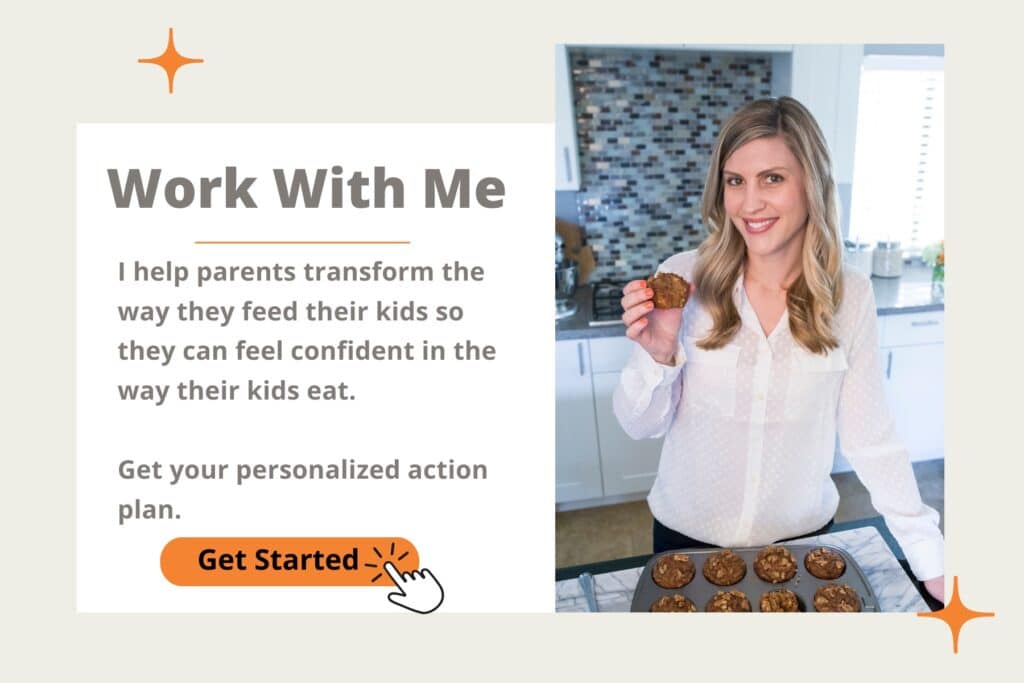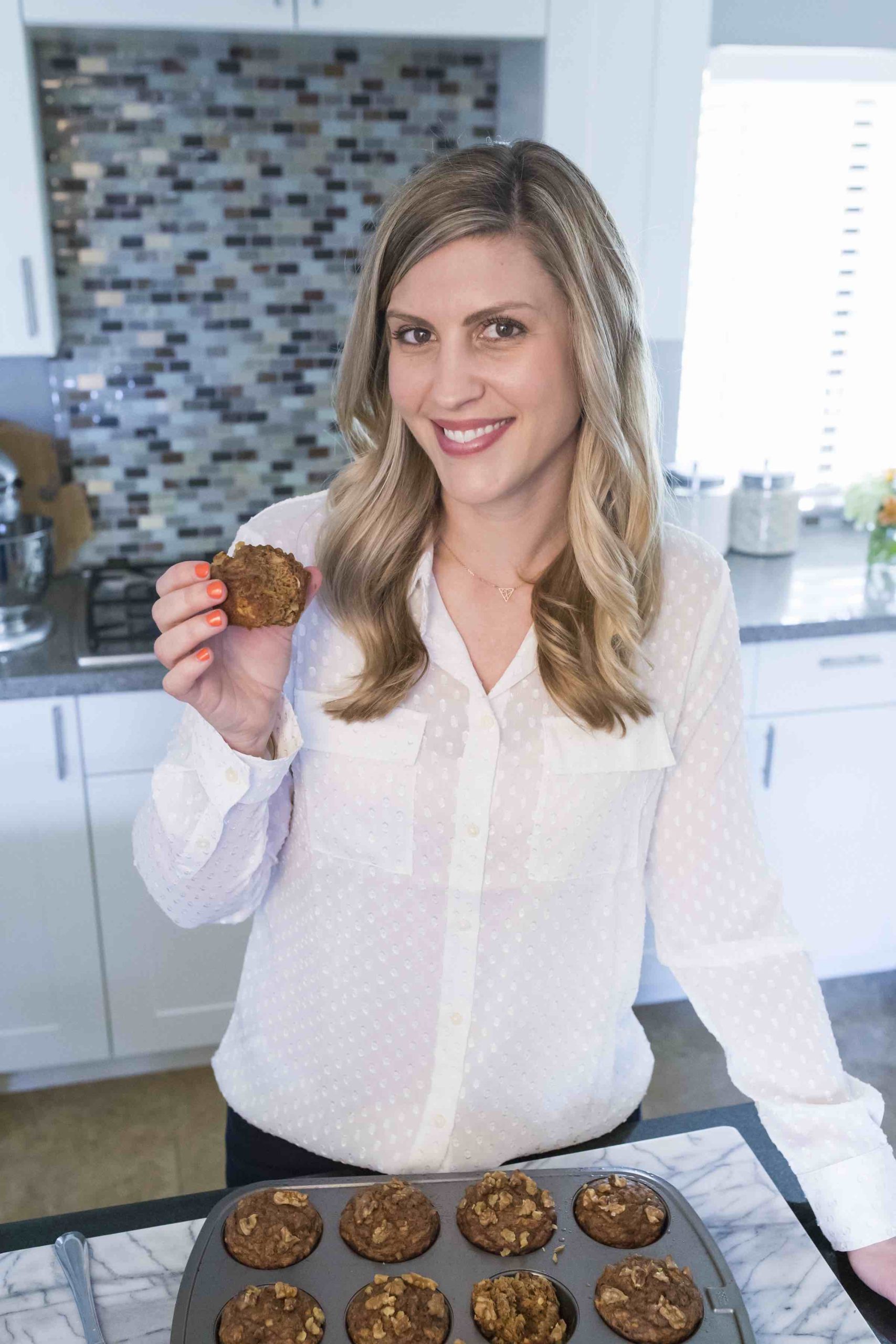Hey there, I’m Jessica Gust, Pediatric Dietitian/child nutritionist, and founder of Element Nutrition Kids. If you struggle with how your kids eat, you are not alone, feeding kids is hard work! This is why I believe every parent should have access to a pediatric dietitian/nutritionist, I’m here to help! I specialize in working alongside parents to transform how they feed their kids and how their kids eat.
Together we can empower your kids to learn to like new food, enjoy a variety of foods from different food groups, come to the table happily without a fight, and grow a lifelong healthy relationship with food and their bodies.
If you’re looking to work with a pediatric dietitian 1:1 right now, you can book an appointment with me here.
If you struggle with picky eating, a child who appears to be “obsessed with sugar,” weight challenges, or even how to get nutritious meals on the table, you’re in the right place.
In this post, I’m going to review what a pediatric dietitian is, why it is important to see a dietitian specializing in pediatric nutrition for your kids, and how you can find one. I’ll also review what you can expect if you work with a pediatric dietitian so you can be sure to find one that is the right fit for you.
*This post was originally published on March 13, 2019 and has been fully updated and revised to reflect the most current information.

Table of Contents
What is a registered dietitian?
Before I dive into the details of a pediatric dietitian, it’s important to first know what a registered Dietitian is. Becoming a registered dietitian is the first step before specializing in pediatrics. A Registered Dietitian Nutritionist (RDN) is a food and nutrition professional who has met very strict educational standards.
- Bachelors/Masters degree: at an accredited university with specific coursework approved by an accreditation council.
- Internship: you then have to be accepted to and complete a supervised practice program. (This is an intensive internship-40 hours per week.)
- During this year you work under experienced dietitians in the field.
- The internship includes rotations at a variety of locations from hospitals to schools to community clinics to sports teams.
- Board exam: after you have completed the internship, you are eligible to take a national board exam.
- The purpose of this is to determine competence.
- There is a minimum score that has to be met to pass, if you pass, you have your RD credential.
- Continuing education: once you become an RDN you have to maintain your knowledge level.
- 75 units/hours of education every 5 years.
- Specialize: once you have extensive experience in an area, you can claim a specialty. Some specialty areas also have their own board exams, which are optional.
If you want to know more details on this, or if you are interested in becoming a dietitian yourself, you can visit the Academy of Nutrition and Dietetics Website.
What is the difference between a nutritionist and a dietitian?
The difference between a nutritionist and a dietitian is their type of education (and experience). All dietitians are nutritionists but not all nutritionists are dietitians. There is no license or official credential for the term nutritionist. Therefore, anyone can call themselves a nutritionist without legal action. Many pediatric dietitians also call themselves “pediatric nutritionists.”
The term Registered Dietitian or Registered Dietitian Nutritionist is protected, meaning you cannot call yourself this if you have not completed the appropriate educational pathways noted above.
If you are seeing a dietitian, you are guaranteed they have received education and training in nutrition. This does not mean that there are not qualified nutritionists, it just means you need to dig further. If someone calls themselves a nutritionist, find out what their training is. Specifically, find out if they have a nutrition degree (bachelor, master, or Ph.D. in nutrition) or if they have just completed some random online training.
Many qualified nutritionists have a bachelor’s, master’s, or even a Ph.D. in nutrition but didn’t choose the path to become a registered dietitian, so do your research before you work with someone.
However, if you’re seeking nutrition help for your kids, I would strongly recommend finding a registered dietitian who specifically specializes in pediatric nutrition. This will be the safest and most effective route for your kids.
What is a pediatric dietitian/pediatric nutritionist?
A Pediatric Dietitian (nutritionist) is a Registered Dietitian Nutritionist (RDN) with extensive experience and training with the pediatric population. This is important because treating kids and treating adults are very different. Pediatric Dietitians generally have experience working as part of a healthcare or interdisciplinary team. This occurs either inpatient (hospitals) or in various outpatient settings.
A pediatric dietitian typically has many connections and networks in the pediatric space as well including therapists, feeding therapists, SLPs, OTs, and pediatricians. This is important for providing the best care for your child.
Many pediatric dietitians have a private practice where they work with kids and families one-on-one either in person, virtually, or a combo of the two. Most dietitians in private practice have had experience in some sort of healthcare or outpatient setting before going out on their own.
If you’re looking to work with a pediatric dietitian outside of a healthcare setting, be sure to ask what their experience and area of expertise are to find the right fit for you.
What does a pediatric dietitian do?
A pediatric dietitian works with kids and their families to improve their food, nutrition, and feeding plans. There are many reasons a child might need to see a pediatric dietitian, I’ll review more on this below.
The first time your child sees a pediatric dietitian they will perform a comprehensive nutrition assessment. This usually includes:
- A full review of their medical history,
- Growth review including height and weight and growth charts
- Assessing their weight and height history
- Getting a thorough picture of their typical food intake
- Asking lots of questions to get to know your child
From there, they will determine what changes may need to be made and work with the family to do so. The number of visits needed will depend on the individual child.
When to see a pediatric dietitian/pediatric nutritionist
There are many reasons a child might need to see a pediatric dietitian, these are some of the more common reasons.
1. Picky eating
If you have a picky eater at home you know how stressful mealtimes are. A dietitian can help you navigate mealtimes, decrease the stress level, and work on ways to get them to try new food.
Picky eating is very common in toddlers and preschoolers but can go on for years if not addressed. The earlier you get help, the better. Many picky eaters also have growth issues associated with their eating habits. A dietitian can perform a comprehensive assessment and help get growth back on track.
Struggling with a picky eater? Download this free e-guide to help your kid start trying new food!
2. Starting solids and baby-led weaning
Starting solids is fun, but can also be overwhelming, especially for first-time parents. A dietitian can help you understand your baby’s nutrition needs, what foods to serve to meet those needs, and how to progress through textures. They can also help you understand the current recommendations for introducing allergens.
If you are considering starting solids with baby-led weaning, a pediatric dietitian can help you decide which method is best for your baby. They can also give you meal ideas if you’re feeling stuck on what to serve.
Getting ready to start your baby on solids? Be sure to check out this comprehensive starting solids guide to support your journey.
3. Nutrient deficiencies
If your child’s doctor identifies a nutrient deficiency (vitamin or mineral), a dietitian can help you get things back on track. The most common nutrient deficiencies I see in my practice are iron deficiency and low vitamin D.
Low iron is especially common in toddlers who are drinking too much milk/milk alternatives, but can happen at any age. A pediatric dietitian can help advise you on the best foods (and or supplements) to include to get your child’s levels back to normal.
4. Constipation
Constipation is very common in children. There are many reasons for this, but diet is one of the major components. A dietitian can help assess your child’s food intake to determine what they need more of (or less of) to help get things moving. They can also give you some easy recipes for constipation to try to help.
Some kids may also benefit from more probiotic-rich foods or supplements, a pediatric dietitian can help you pick the best one for your child.
A pediatric dietitian will aim to focus on natural remedies for constipation first, but there may be times when medication is needed as well. If this is the case, they will also work alongside your pediatrician.
5. Child Athletes
If you have a child athlete, getting proper nutrition is key to performance, recovery, and optimal growth. Because kids are growing so rapidly, their nutrition is especially important with high physical activity levels. Finding a dietitian who specializes in working with kids AND athletes is key.
6. Weight Concerns
If you or your child’s doctor has concerns about their weight or growth a pediatric dietitian can perform a comprehensive assessment to determine if there is a true issue. It is important to remember that all kids are different and so is their growth. Some kids are very healthy in larger bodies, some in smaller bodies. A pediatric dietitian will assess their intake, food environment, etc.
I strongly recommend not discussing your child’s weight with their doctor in front of them. If you have concerns about your child’s weight, try to have that conversation separately and then come up with a plan. Weight can be a very sensitive topic for kids and we want to prevent mental health issues surrounding weight.
7. Food Allergies
If your child has food allergies they may be missing out on key nutrients by eliminating foods from their diet. A pediatric dietitian can help ensure they are getting those nutrients from other sources. Milk protein allergy is a common one and finding the right milk alternatives can help.
8. Other Reasons
There are many other reasons to see a pediatric dietitian, not reviewed in this post. If you have any concerns with your child’s growth, diet, or nutrition, talk with their pediatrician about getting a referral, or read below for additional ways to find a pediatric dietitian.
How to find a pediatric dietitian to work with
If you are a parent and looking to work with a pediatric dietitian, there are a couple of searches I recommend.
1. Academy of Nutrition and Dietetics: Search “Find An Expert”
This is ideal if you want to work with a pediatric dietitian in person or utilize your health insurance for a specific medical issue. Any dietitian who enrolls in the “find an expert” tool will pop up when you type in your zip code. You can see their specialty area when you click on their profile.
2. Search pediatric dietitian or pediatric nutritionist near me: via Google search
If you search Google for the terms “pediatric dietitian near me,” “pediatric nutritionist near me” or “child nutritionist near me” local dietitians listed with Google that work with kids in your area should pop up.
Pediatric dietitians local to you who note in their Google listing that they are pediatric dietitians should pop up on the top of the page. Google recognizes your zip code so this will help find someone local. Use the listings to see if any are a good fit for you, always double-check their credentials and experience.
3. Find a virtual Pediatric Dietitian
If you are looking to help your kid with a non-medical nutrition issue such as picky eating, healthy meal planning, starting solids, etc. You can work with a virtual dietitian that might be a good fit for you. I work with families all over the world to help support their kid’s nutrition.
This is a good option if you don’t plan to use insurance and your child doesn’t have medical issues that the dietitian would need to contact the pediatrician for. Dietitians are licensed health professionals so they have limits as to what they are legally allowed to cover across state lines.
4. Reach out to other local Dietitians
If you are struggling to find a local pediatric dietitian, other dietitians in your area should be able to give you recommendations. I often get calls from parents who were referred to me by other dietitians.
If a client calls me that is not in my specialty area, I refer them to another dietitian who would be a better fit for them. Most dietitians are great at networking with other dietitians and know many people who may be a good fit for you.
In summary
A pediatric dietitian is a registered dietitian with extensive experience working with the pediatric population. They can help and support you with a variety of nutrition issues including picky eating, starting solids, weight/growth concerns, nutrient deficiencies, and healthy meal planning (among others).
Depending on what issues you are facing you might want to find a local dietitian or a virtual dietitian to best support you and your child. The most important thing is to find someone with experience working with kids. This will help protect your family and ensure you are receiving the best care possible.
If you need help from a pediatric dietitian I have over 15 years of experience working with kids, and I’d love to support you. You can book a call with me to get started or learn more about my experience and qualifications. I also have several free resources you can download to get started.
You can also contact me with any questions you might have about helping your child.



HI. WE ARE A PEDS OFFICE ALWAYS STRUGGLING TO FIND NUTRITIONIST FOR OVER WEIGHT CHILDREN. ENDOCRINOLOGY WONT SEE THEM TILL THEY HAVE AIC OF 6.0. IF YOU HAVE TIME TO CALL ME IT WOULD BE GREAT. THANK YOU. ROSIE 247-1471.
Hi Rosie,
I sent you an email 🙂